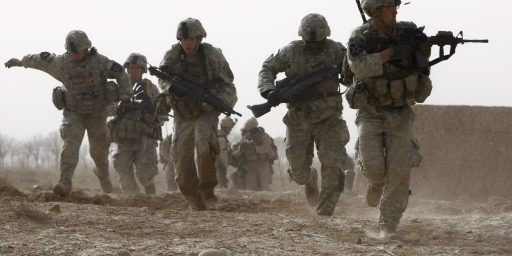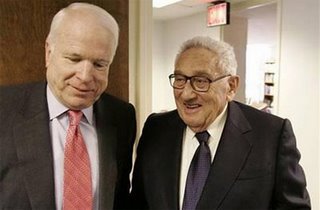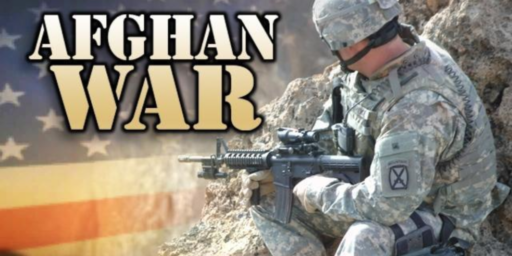Winning in Afghanistan
In an op-ed in this morning’s Wall Street Journal Brookings Fellow Michael O’Hanlon proposes stabilizing Afghanistan by substantially increasing the size of the Afghan National Security Forces, largely funded by the United States:
The United States has been spending nearly $3 billion a year to fund the Afghanistan security forces of late. This is a great deal of money but far less than our own military costs in that country. We should be willing to double that $3 billion a year if need be. The added expenses need not stay high indefinitely. Once Afghanistan’s security forces have their needed equipment, and provided President Obama can cajole and pressure other major countries to foot their share of the bill, American security aid requirements should drop back to current levels.
[…]
Helping the Afghanistan government recruit, vet, train and equip a total of 300,000 to 400,000 security forces will take time as well as money. Only some 40% of necessary American and NATO trainers are in place even for the current scale of effort. We have about 2,000 trainers in Afghanistan (compared with nearly 6,000 in Iraq), and NATO allies have just another 500. Doubling this scale of effort will take a new infusion of resources, including perhaps the transformation of some American combat brigades into what retired Army Colonel John Nagl describes as an Army adviser corps.
I’m afraid it will take more than time and money. It may well take a familiarity with local conditions that’s beyond our capability and may well be beyond the capabilities of the government in Kabul as well.
Mere numbers won’t be enough. The constitution of any Afghan security forces will need to take tribal loyalties and structures into account. Here’s what Col. Pat Lang, who certainly knows more about the subject than I do, had to say on the subject:
Afghanistan is a country dominated by tribal loyalties and structures. No matter what the State Department or his political scientist advisers may tell him [ed. Gen. McKiernan, to whose comments Col. Lang was responding], those loyalties and lifeways are not going to change much any time soon. The US government is rotten with the political science inspired notion that societies evolve and “progress” in the direction of the creation of geographically logical centralized states. This is merely a theory. It was created to provide a satisfactory (to some)explanation of European history.
The Afghan government of today is merely one of the many “players” in the complex socio-political situation in Afghanistan. If the United States backs the Karzai government with the idea of creating a highly centralized state in Afghanistan, then it is going down the road to re-creating the same social chaos that led to several years of ferocious tribal and factional revolt in Iraq.
Afghanistan is never going to be the kind of country that the neocons would like to see. Success in Afghanistan will require a realistic use (manipulation if you prefer) of the actual playing pieces on the board of Afghan Chess.
Can the existing Afghan government adequately engage its tribal and clan competitors and adversaries? I doubt it. The ability to coordinate the efforts of varied tribal entities often depends on a certain independence of interest.
I’ve made no secret of my opinion on the subject of Afghanistan, namely that we need to revisit our strategic objectives there. It may well be true that a larger Afghan national security force is part of the eventual solution that emerges there. I sincerely doubt that either increasing the number of NATO forces or increasing the size of the Afghan security force to any size that the American people are willing to bear will result in victory in the current objectives.





All things being static, perhaps.
However if we add into this mix another 9/11 style attack… I wonder if the reality wouldn’t change.
I’ve asked the questions before and neither you nor any of the other commenters here has answered them: what are our strategic objectives in Afghanistan, how can we achieve them, how much will it cost, and how long will it take?
An attack might change our strategic objectives but it won’t change our ability to achieve the present objectives.
“I’ve asked the questions before and neither you nor any of the other commenters here has answered them: what are our strategic objectives in Afghanistan, how can we achieve them, how much will it cost, and how long will it take?”
Dave,
Entirely legitimate question. Also possibly a fairly tall order for commenters to answer given that you’ll encounter a lot of people within the (at least within the British) defence community who would argue that the people who are paid to work full time on these things haven’t really grasped the nettle and managed to come up with a coherent answer.
I think much of what O’Hanlon says is perfectly reasonable. The problem, as with much of the commentary on this sort of thing, is that – funding aside – it tends to waft over the question of how we get from A to B. How do I afford a mansion and a Ferrari? Get rich! Well, ok…
If we divide the Afghan Security Forces into two sections (setting aside the various pretty questionable paramilitary wallahs your people are running), ANA and Police, they’ve both got problems. It’s no news to anyone that the police force is a corrupt, incompetent horror story. It’ll be difficult enough to turn round what we’ve got already, let alone expand effectively. The army is widely held to be better quality and less corrupt (albeit with a level of effectiveness that is very heavily contingent upon the quality of leadership, which is variable). But it’s nothing like a “national” force. It’s very heavily dominated by Tajiks and, to a lesser extent, Uzbeks. That’s just one of the problems.
Look, the O’Hanlon piece is a newspaper comment job, with all the forgivable limitations associated with that. But in order to actually be useful we need less stuff along the lines of “We need to expand the Afghan security forces” and more along the lines of “This is how I think we should be looking at reforming the forces to ALLOW an effective expansion to happen”. He really doesn’t grasp that nettle.
Anthony:
Tell order or no I think it’s perfectly reasonable, when someone tells me that we must achieve victory in Afghanistan, to ask what the heck he or she means and what he or she thinks it will take. Quite agreed on your point that those who are paid to work full time haven’t stepped up to the plate.
Also agreed that more commentary on what forces would encourage an effective expansion to happen would be useful. O’Hanlon implies it’s money alone, which I doubt.
I’m making the additional point that the nature of the expansion is important, too, and, unfortunately, not only is it beyond us but there isn’t anybody in place who can do the job.
If you’re talking to me, Dave, I should have thought the answer obvious to the point of the question being nonsensical.
Clearly, the objective is to put and keep moderates in power, over the long haul, or, perhaps put another way, keeping the Islamic crazies OUT of power, while also keeping the same Islamic crazies from gaining enough strength to cause the rest of the world problems.
I suspect and suppose there are, in enough Afghan nationals to do the job, once filtering and training has been dealt with.
As to how much and how long, why is that critical to the decision making process? Shying away from a big job, only makes it take longer.